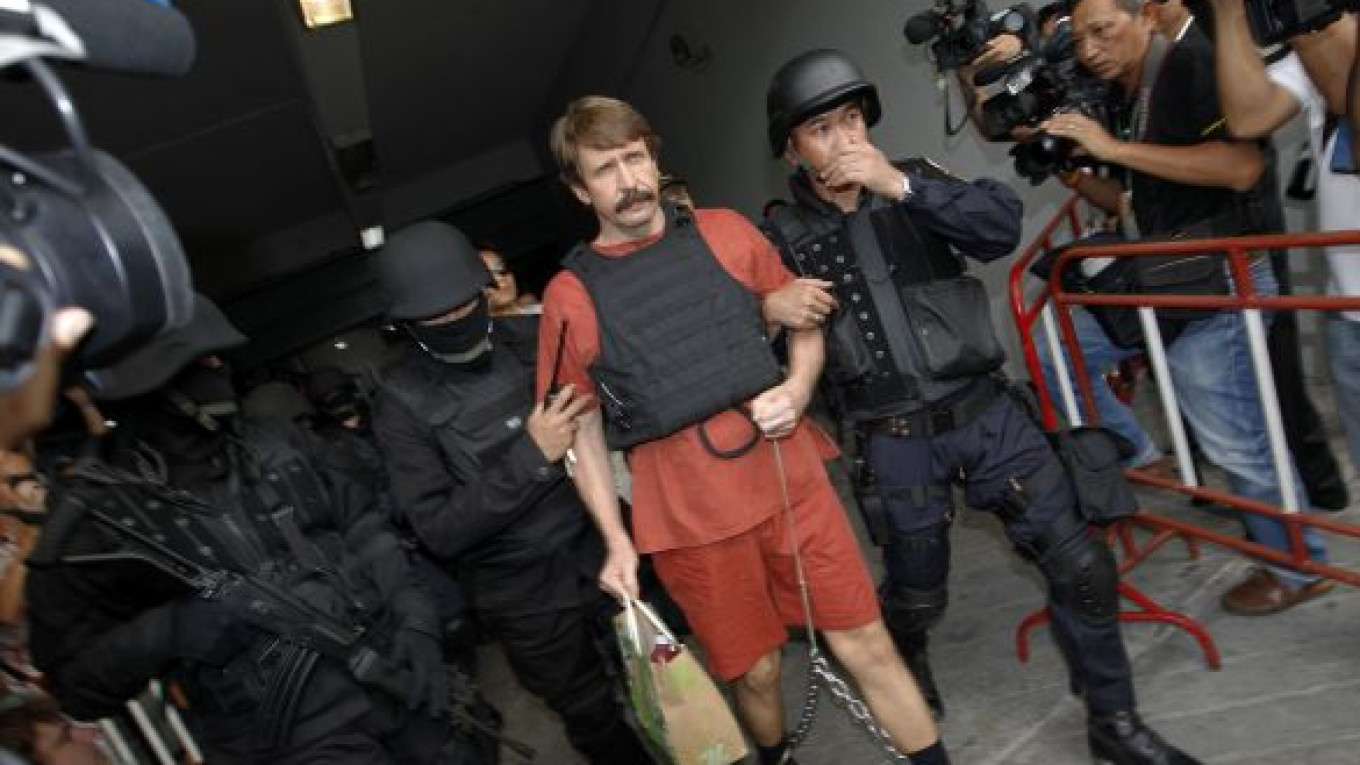BANGKOK, Thailand — Reputed arms smuggler Viktor Bout's long-awaited extradition to the United States hit another delay Monday when a Thai court ruled that it needs to consider other charges filed against him by Washington.
The ruling by the Bangkok Criminal Court is another blow to the United States, which had expected Bout's rapid extradition after a Thai appeals court gave its approval on Aug. 20. He faces trial in the United States on four terrorism-related charges and could be sentenced to life in prison.
The delay stems from a second set of charges filed against Bout by Washington as a precautionary measure to secure his extradition, a move that is now ironically stalling the process and could even scuttle it if there are long legal delays.
The criminal court said it would rule Tuesday on whether Bout should face extradition on the new charges of money laundering and wire fraud, noting that the decision can be appealed.
Bout, a 43-year-old former Soviet Air Force officer, is reputed to be one of the world's most prolific arms dealers. He has been jailed in Bangkok since March 2008 when a U.S.-led sting operation ended years of searching for the elusive Russian who has been referred to as "The Merchant of Death."
Dressed in an orange prison uniform and shackled at the ankles, Bout said the latest ruling would give him more time to battle the U.S. extradition request.
"There is enough time now to prove that the charges in my first case were biased and unfounded," Bout told Itar-Tass.
His wife, Alla Bout, said "now it is absolutely clear to everyone that the case is absolutely political," Itar-Tass reported.
The case has plunged Thailand into a diplomatic dilemma, with Washington demanding Bout's extradition to face terrorism charges and Moscow demanding his release, saying Bout is an innocent businessman. Experts say Bout has knowledge of Russia's military and intelligence operations and Moscow does not want him to go on trial in the United States.
The Appeals Court that ordered Bout's extradition on Aug. 20 reversed a lower court's decision from a year earlier. Rescinding the second set of charges that had been filed by the United States initially appeared to be a technicality. Washington submitted its request in late August to the Thai Foreign Ministry to drop the charges.
However, under Thai law, a defendant has the right to object to charges against him being dropped — a stance that Bout's lawyer openly said he would take as a way to stall the extradition.
The court said in its Monday ruling that "the legal procedure will resume" because Bout objected to the charges being dropped.
Long legal delays could scuttle the extradition entirely. When the Appeals Court cleared the way for Bout's extradition in August, it said the extradition must take place within three months, or roughly by Nov. 20.
Bout arrived at court Monday with a dozen armed commandoes, apparently reflecting new concerns for his safety. He wore a flak jacket to court for the first time, in addition to his standard ankle shackles. The Russian was also driven to court in his own security van, rather than riding with other prisoners.
Bout's high-profile arrest at a Bangkok luxury hotel in March 2008 was part of an elaborate sting in which U.S. agents posed as arms buyers for the Revolutionary Armed Forces of Colombia, or FARC, which Washington classifies as a terrorist organization.
The head of a lucrative air transport empire, Bout long evaded UN and U.S. sanctions aimed at blocking his financial activities and restricting his travel. He has denied any involvement in illicit activities and said he ran a legitimate business.
Bout asserted his claims of innocence in a letter to the Thai parliament, distributed to reporters Monday by his wife.
"I have never sold weapons to anybody," Bout said in the letter, which called for a parliamentary investigation to review his case. "It has become apparent to me that the Appeals Court decision to extradite me was taken under political pressure."
Thai Prime Minister Abhisit Vejjajiva said last week that he would have the final say in the politically sensitive case, once it works its way through the courts.
A Message from The Moscow Times:
Dear readers,
We are facing unprecedented challenges. Russia's Prosecutor General's Office has designated The Moscow Times as an "undesirable" organization, criminalizing our work and putting our staff at risk of prosecution. This follows our earlier unjust labeling as a "foreign agent."
These actions are direct attempts to silence independent journalism in Russia. The authorities claim our work "discredits the decisions of the Russian leadership." We see things differently: we strive to provide accurate, unbiased reporting on Russia.
We, the journalists of The Moscow Times, refuse to be silenced. But to continue our work, we need your help.
Your support, no matter how small, makes a world of difference. If you can, please support us monthly starting from just $2. It's quick to set up, and every contribution makes a significant impact.
By supporting The Moscow Times, you're defending open, independent journalism in the face of repression. Thank you for standing with us.
Remind me later.






